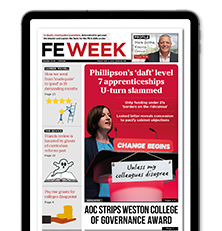Students are still much more likely to get good quality careers guidance and advice on going to university than they are about apprenticeships according to the Sutton Trust.
In a new report on the state of careers guidance in secondary schools, the social mobility charity has found that only 10 per cent of 17 and 18 year olds surveyed had received a “large amount” of information about apprenticeships, compared to 46 per cent who said they had received the same amount about university routes.
Published today, ‘Paving the Way’ compiles a survey of 3,140 secondary school teachers and 1,083 pupils and students aged between 11 and 18 from schools and colleges.
Researchers were able to compare results received from state and private schools. They found that 39 per cent of pupils in state secondary schools said that they were not confident in their next steps in education and training compared to 29 per cent of pupils in private schools.
This isn’t the Sutton Trust’s first venture in to researching the effectiveness of careers information, advice and guidance in schools and colleges.
Back in 2014, the trust highlighted how there were significant differences in the quality of careers provision that pupils had access to across the country. The report from eight years ago recommended a stronger national strategy and more effective incentives and statutory duties on schools and colleges to provide high quality guidance on vocational education options as well as university routes.
Today’s report makes depressingly similar recommendations but recognises some of the shifts in spending and policy priorities that have, albeit with questionable success, attempted to improve the careers information offer to young people.
For example, researchers found a positive correlation between engagement with the Gatsby Foundation’s careers quality benchmarks and measures around a student’s career readiness.
On the other hand, the report notes that the Department for Education’s attempts at statutory guidance in 2015 and 2021, the Baker Clause and the work of the National Careers Service and Careers and Enterprise Company still leaves major gaps and variations across different types of schools.
Almost a third (32 per cent) of teachers in state schools said that they don’t have enough funding to deliver good quality careers education and guidance, compared to just 6 per cent in private schools. Whereas around half (51 per cent) of teachers in state schools think there isn’t enough staff time to do so, compared to just over a third (34 per cent) in private schools.
The Sutton Trust’s chief executive, James Turner, is using today’s report to argue for a more differentiated approach which recognises the differences in access to good quality advice and guidance found in state compared to private secondary schools:
“As the government looks to make further changes to the qualifications and funding landscape, it is more important than ever that young people have the information, advice and guidance that they need to feel confident in their next steps.
“The government must urgently develop a new national strategy on careers education and all schools, especially those serving the poorest communities, should be supported to offer the highest-quality provision” he said.
As well as differences in the quality of careers advice and guidance on offer, researchers also found that less than a third of sixth form age students – specifically 17 and 18 year olds – had completed work experience activities.
Further, students in private were more likely than students in state schools to have received careers information in their usual curriculum, dedicated careers conversations with teachers and sessions with a careers adviser. Private school pupils were slightly less likely though to have received advice on local job or career opportunities.
Responding to today’s reports, the Association of School and College Leaders (ASCL) makes the case for career advice as a specialist service undermined by more than a decade of unsuccessful reform and pressures on funding.
ASCL’s general secretary, Geoff Barton, said:
“The main reason that there is variation in careers advice is that the government dismantled the national provision about a decade ago and transferred the responsibility to schools while also squeezing their funding. Since then it has endeavoured to make up for lost ground with only partial success.
“This report draws attention to the need for more information on apprenticeship options, for example, which would certainly be helpful. However, the apprenticeships landscape is complex and difficult to navigate and is a case in point where extensive knowledge of a variety of workplaces and apprenticeship vacancies is needed to deliver this sort of guidance.”

















“They found that 39 per cent of pupils in state secondary schools said that they were not confident in their next steps in education and training compared to 29 per cent of pupils in private schools.”
The less affluent have fewer realistic life choices and face more competition, which erodes confidence. This particular gap is more reflective of wealth inequality in society.
It would be interesting to see some stats on differences in progression to apprenticeships & degrees from state versus private schools.
Personally, I think that the Gov predicting that only 25% of student loan recipients will pay back their loan in full should be ringing alarm bells and that careers advice should be coupled with education on the financial implications of deciding their next steps…
Avoiding the disproportionate drag effect that debt has on the majority will do more for social equality and mobility than pumping up false confidence with ‘aspiration’.